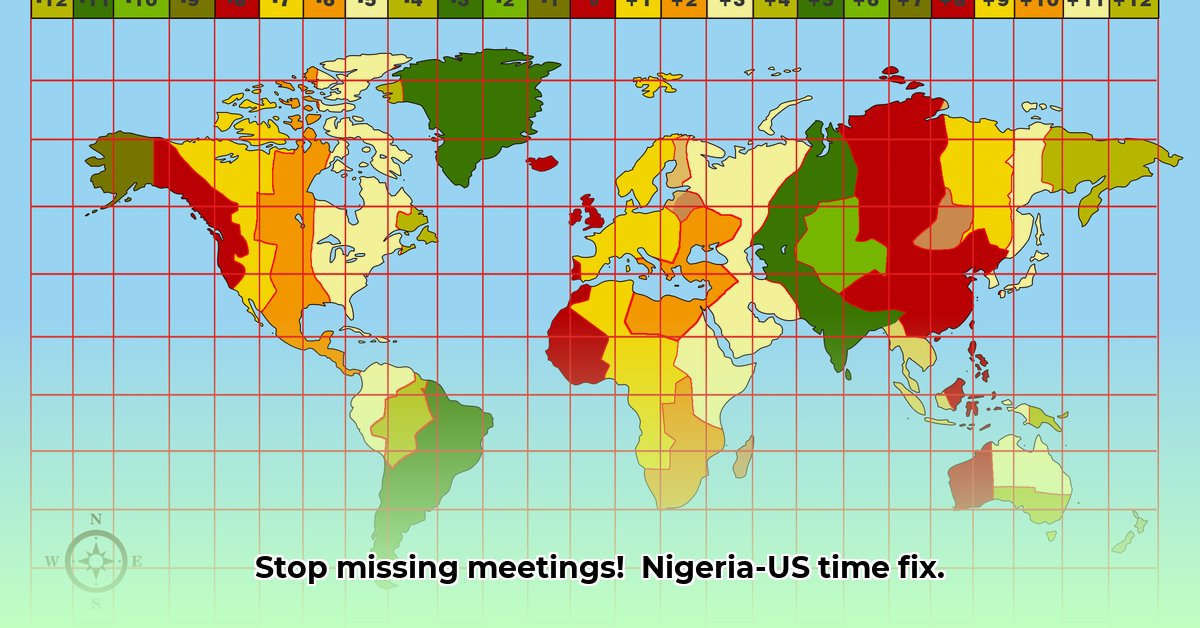
Understanding the Time Difference: More Than Just 5 Hours
Planning a meeting, call, or trip involving Nigeria and the US? Mastering the time difference is key. While a general 5-hour difference exists between Lagos, Nigeria, and the East Coast (EST) of the US, this isn't a universal truth. For more detailed information on Nigeria time differences, check out this helpful resource: Nigeria Time Zones. The US spans multiple time zones, each with its unique offset from Lagos. This means the actual time difference can vary significantly. Did you know that failing to account for this difference can lead to missed meetings and lost business opportunities?
US Time Zones and Their Impact on Time Conversions
The US uses four main time zones: Eastern Standard Time (EST), Central Standard Time (CST), Mountain Standard Time (MST), and Pacific Standard Time (PST). During Daylight Saving Time (DST), these become EDT, CDT, MDT, and PDT, respectively. This seasonal shift adds an extra layer of complexity. The following table details the time differences from Lagos, Nigeria, considering both standard and daylight saving time:
| US Time Zone | Standard Time Difference from Lagos (Nigeria) | Daylight Saving Time Difference from Lagos (Nigeria) | Example City |
|---|---|---|---|
| Eastern (EST/EDT) | -5 hours | -4 hours | New York City, Washington D.C. |
| Central (CST/CDT) | -6 hours | -5 hours | Chicago, Dallas |
| Mountain (MST/MDT) | -7 hours | -6 hours | Denver, Phoenix |
| Pacific (PST/PDT) | -8 hours | -7 hours | Los Angeles, San Francisco |
Using a Nigeria US Time Zone Converter: A Step-by-Step Guide
Online time zone converters streamline the process. Here’s how to use one effectively:
Find a Reliable Converter: Search online for "Nigeria US time zone converter." Many reputable options exist. Choose one with a clear interface and recent updates. Accuracy is paramount; a poorly maintained converter could lead to costly scheduling errors.
Specify Locations: Select "Lagos, Nigeria" as your origin. Then, precisely select the US city (e.g., "New York City," not just "USA"). This ensures accurate time zone identification. Have you ever experienced the frustration of a missed meeting due to an incorrect time conversion?
Enter the Time: Input the time you wish to convert (either Lagos or US time, depending on your need).
Verify the Converted Time: The converter will display the equivalent time in the other location. Always double-check the result, paying attention to whether Daylight Saving Time is in effect. A simple confirmation step can prevent significant scheduling issues.
(Image: Screenshot of a user-friendly time zone converter interface, highlighting the key fields: origin city, destination city, and time input/output.)
Real-World Applications of the Converter
A time zone converter is a valuable tool for diverse users:
Businesses: Seamlessly schedule international calls, meetings, and collaborations, minimizing confusion and maximizing productivity. Imagine the potential cost savings from preventing a single missed deadline!
Travelers: Effortlessly plan trips, appointments, and communications, ensuring you're always on time.
Developers: Build time-aware applications with precise time displays, crucial for user experience and data integrity.
Potential Pitfalls and How to Avoid Them
Even with a converter, awareness of potential pitfalls is essential:
Daylight Saving Time (DST): Always account for DST shifts in both Nigeria and the US. Failure to do so is a common source of error.
City Selection Accuracy: Avoid vague locations like "USA." Specify the city to ensure precise time zone selection.
Converter Reliability: Ensure your converter is up-to-date and well-maintained. Regularly check for updates to ensure accuracy.
By using a reliable time zone converter and following these guidelines, you can avoid scheduling conflicts and guarantee effective communication across the Atlantic. The benefits extend far beyond simple convenience—they translate into improved productivity, more efficient use of time, and stronger professional relationships.